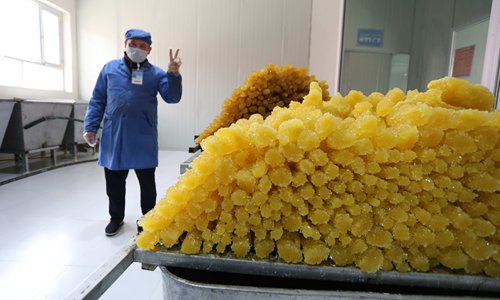HOME >> CHINA
New Xinjiang report slammed
By Liu Caiyu and Liu Xin Source:Global Times Published: 2019/6/26 22:48:40
Ideology, not ethics, motivates Western media: observer

A worker poses next to a pile of iced sugar at a vocational training center in Hotan's Yutian county, Xinjiang Uyghur Autonomous Region, on October 20. Photo: Fan Lingzhi/GT
Another story on a so-called victim of the vocational training centers in Northwest China's Xinjiang Uyghur Autonomous Region made up by a Canadian media outlet was verified as "fake" on Wednesday, and experts called on some Western media to stick to journalism ethics and make fair reports on Xinjiang.
"It has been verified that Nurmuhemmet Tohti, as reported by The Globe and Mail, had never been in Xinjiang's vocational education and training center and had never been arrested," the Chinese Embassy in Canada said in a statement on its website on Wednesday.
The Globe and Mail reported on June 25 that Tohti had been detained and taken to an indoctrination camp in Xinjiang in November 2018.
The Chinese Embassy in Canada said that "by fabricating stories and adopting a double standard, some international anti-China forces wantonly hype and distort the Xinjiang related issue with sinister intentions."
The Globe and Mail's report on Tohti is the latest report from Western media on the "victims" of the training centers in Xinjiang, which were later verified as "fake" by the Chinese side.
At a regular news conference on June 18, Chinese Foreign Ministry spokesperson Lu Kang said that the ministry has made efforts to obtain more information and offered responsible feedback to journalists who asked about individual cases related to Xinjiang, but "those same journalists failed to give it open and accurate coverage."
Some Western media do not practice professional ethics, which made fake news on Xinjiang policies, and it seems they will not stop fabricating similar stories on the 10th anniversary of the riots in Urumqi on July 5, 2009, experts said.
The riots left 197 people dead and more than 1,700 injured. Terrorists from the "East Turkistan" forces engineered the riots, according to a white paper on Xinjiang released by the State Council Information Office in March.
Although China has reiterated on many occasions that the purpose of its policies in Xinjiang is to fight terrorism and extremism, but some Western media insist on telling unreliable stories of so-called victims of the training center, Li Wei, a counter-terrorism expert at the China Institute of Contemporary International Relations in Beijing, told the Global Times.
Li said that due to their long-term bias and political stance, some Western media would rather spread rumors than make fair points of view on Xinjiang.
Erkin Öncan, a Turkish journalist who focuses on China's Xinjiang reports, told the Global Times on Wednesday that "Western media is ideologically motivated and 'forgets' journalism ethics when it comes to China."
Li continued to note that China and its media should keep telling the truth about Xinjiang.
Erkin said China has taken some efficient actions against fake news on Xinjiang in the diplomatic sphere, although the Western media will always find a way to spread more fake news.
Aierken Tuniyazi, a senior Xinjiang official, said at the ongoing 41st UN Human Rights Council session on Tuesday that Xinjiang aims to educate and save those influenced by religious extremism by setting up vocational education and training centers. No violent and terrorist attacks have occurred in Xinjiang for nearly three years and local residents' sense of security has been greatly improved.
Erkin invited members of the UN Human Rights Council to Xinjiang.
Posted in: SOCIETY